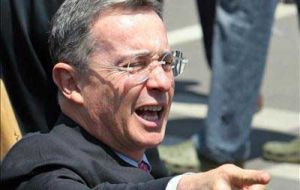MercoPress. South Atlantic News Agency
Colombia to bring genocide charges against Chavez
 Pte. Uribe accused Pte. Chavez of financing FARC
Pte. Uribe accused Pte. Chavez of financing FARC Colombian President Alvaro Uribe announced Tuesday he will ask the International Criminal Court in Rome to bring genocide charges against President Hugo Chavez of Venezuela. He accused Mr Chavez of sponsoring and financing Colombian FARC rebels. Venezuela denies the charge.
Colombian officials say a laptop found during a raid on a FARC camp in Ecuador held files indicating Venezuela gave FARC 300 million US dollars. Colombian forces entered Ecuador to raid the camp, provoking furious protests and a diplomatic crisis between the three countries. "Colombia proposes to denounce the president of Venezuela, Hugo Chavez, in the International Criminal Court for sponsoring and financing genocide" Mr Uribe said. Venezuela and Ecuador have broken off ties with Colombia and moved troops to the Colombian border. Saturday's incursion by Colombian forces into Ecuador saw the killing of senior FARC commander Raul Reyes and 16 others rebels. The latest reports indicate that Venezuela is moving 9.000 troops and equipment to the border with Colombia. Colombian Vice-President Francisco Santos, speaking earlier at a disarmament conference in Geneva, said evidence of plans to make a dirty bomb - a bomb using radioactive material - was also found on the computer. For its part, Venezuela has said it is expelling all Colombian diplomats in the wake of the raid. Ecuador said the raid had frustrated a possible deal to free French-Colombian FARC hostage Ingrid Betancourt. Latin American powers including Chile, Mexico and Brazil have offered to mediate in the dispute. An emergency meeting of the Organization of American States is being held to discuss the crisis. Marxist oriented FARC (Revolutionary Armed Forces of Colombia) has been fighting for more than four decades with the declared aim of a fairer wealth distribution in the country but in the last two decades has moved close to the cocaine trade as a source of funding together with hundreds of hostages kidnapped for ransom and political ends. Venezuela's president Chavez is known to be a political supporter of the FARC "revolutionaries" and has long been suspected of helping the rebels, although it has never been proven. However Mr. Chavez has been instrumental in the brokering of the recent FARC hostages release, and apparently is/was involved in further similar actions. Venezuela's military currently has an estimated 100,000 regular troops and a growing force of reservists that now totals 280,000. Under President Chavez and taking advantage of the oil windfall Venezuela has gone shopping for new equipment for the three services. The International Criminal Court was established in 2002 as a permanent tribunal to prosecute individuals for genocide, crimes against humanity, war crimes and the crime of aggression, although it cannot currently exercise jurisdiction over the crime of aggression. The Court came into being on July first 2002, the date its founding treaty, the Rome Statute of International Criminal Court entered into force, and it can only prosecute crimes committed on or after that date. As of February 2008, 105 states are members of the Court and a further 41 countries have signed but not ratified the Rome Statute. But a number of states, including China, India and United States are critical of the Court and have not joined




Top Comments
Disclaimer & comment rulesCommenting for this story is now closed.
If you have a Facebook account, become a fan and comment on our Facebook Page!